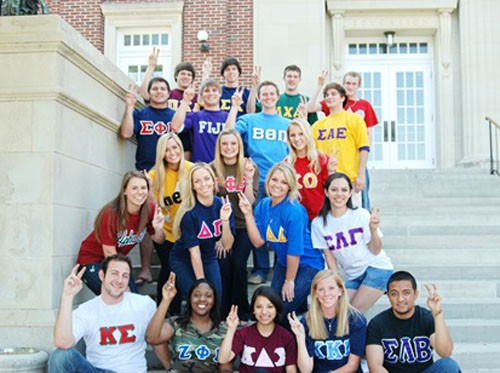By Yousef Al Khan

We come to college knowing very few people. First-year students go to Mustang Corral, join clubs, play sports, roam the halls looking for people with similar interests and get involved within their departments as a means to make friends.
Over your time in college, you develop your own family. When you are upset, you find someone to call to get your mind off of things. When you are hungry, you find someone to go to grab a bite with. When you want to go to the rec center, you find someone to go with. You slowly but surely build up a base of friends that will eventually be the people that will stand next to you in your wedding.
We are humans. We all have similar needs. One of those needs happens to be the need to belong to something. Here at SMU, I see Greeks providing more benefits and opportunities for students than most organizations on campus. They work hard to provide a vibrant student life and a personal experience that lasts a life time.
A few years ago, I stood in a chapter room with around 90 people who I now consider to be some of my best friends. When I was in that room, I took an oath. The oath that I said was probably similar to the oath said by a Sigma Alpha Epsilon or a Kappa Alpha to his brothers; similar to the oath said by a Pi Beta Phi or a Chi Omega to her sisters. In that room on that day, I swore that I would better myself. I promised that I would uphold the values that the founders of my fraternity saw to be important. The badge that I wear serves as a perpetual reminder of the oath I made that day.
When I joined my fraternity, I wasn’t looking to buy friends, fit in or become a burden on the University. I became good friends with a group of guys and sought to join and support their vision. To join, I didn’t have to chug a handle of vodka, humiliate myself, brand myself or forfeit my rights as a human being. I had to prove myself responsible for my own actions, show that I was a man of integrity and a man that could make my fraternity better, rather than need the fraternity to make me better.
While binge drinking and hazing incidents involving Greeks are glorified and reported on as the status quo, or attempts of “uncovering the truth about Panhellenic Recruitment” are printed on front pages, the real benefits and objectives of Greek Life such as, philanthropy, community service, networking, brotherhood and sisterhood are unheralded in the media in college campuses around the nation. I do not fault anyone for expressing their opinion. It is a part of the beauty of this country, but I only see it to be fitting to make mention of the good Greeks do.
Last year alone, SMU Greeks raised $277,837 for local, national and international causes and philanthropies, in addition to $18,000 raised in only 5 days by members of Sigma Chi and gifted to Utah’s Huntsman Cancer Institute to aid their mission in putting an end to cancer. Greeks performed 11,447 community service hours leaving an economic impact of $267,859. Greeks proved a higher standard of commitment to the educational mission of SMU, earning a higher GPA than non- Greeks with 78% of the Greek membership at or above a 3.0 GPA as well. They make up the majority of student leaders on campus and hold prominent student leadership positions in Student Senate, Program Council and Student Foundation. Greeks also serve as AARO Leaders, Mustang Corral Leaders, Resident Life and Student Housing Assistants, athletes in sport clubs, members of the Mustang Band and SMU Ambassadors.
Despite all the unfair negativity portraying Greeks, fraternities and sororities have a prideful long standing history at SMU that goes back as far as 1915. We are reminded every day through buildings, commons, statues, and gardens that honor our outstanding alumni, or by an email announcing a generous gift made by another. Today, they remain the largest and strongest community in SMU’s history.
Al Khan is a graduate student studying economics.








